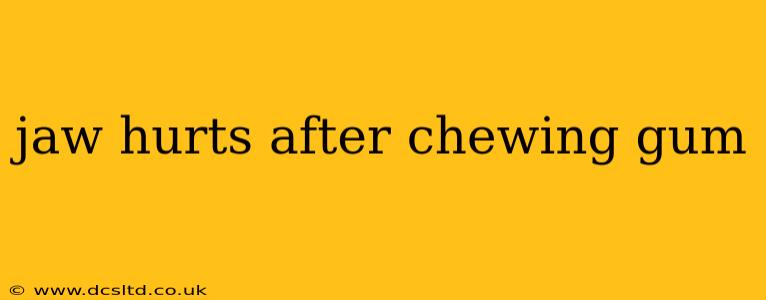Chewing gum, a seemingly innocuous habit, can sometimes lead to jaw pain. This discomfort can range from a mild ache to a sharp, debilitating pain, significantly impacting daily life. Understanding the causes behind this issue is crucial for effective management and prevention. This comprehensive guide explores the reasons why your jaw might hurt after chewing gum, offering solutions and preventative measures.
What Causes Jaw Pain After Chewing Gum?
The most common culprit is temporomandibular joint (TMJ) disorder. The TMJ is the joint connecting your jawbone to your skull. Excessive chewing, especially forceful or prolonged chewing like that associated with gum chewing, can strain these delicate joints, leading to inflammation and pain. This strain can manifest as pain in the jaw, temples, or even ears.
Another contributing factor is bruxism, or teeth grinding. While often associated with sleep, bruxism can also occur during the day, particularly when stressed or unconsciously clenching your jaw while chewing gum. This repetitive grinding further exacerbates TMJ issues and intensifies jaw pain.
Why Does My Jaw Hurt After Chewing Just ONE Piece of Gum?
Even a single piece of gum can trigger jaw pain if you have pre-existing TMJ problems or a predisposition to bruxism. The act of chewing, even mildly, puts stress on the jaw muscles and TMJ. If your jaw is already sensitive or inflamed, a single instance of chewing can be enough to cause discomfort.
Can Chewing Gum Cause TMJ?
While chewing gum doesn't directly cause TMJ disorder, it can certainly exacerbate existing conditions or trigger symptoms in susceptible individuals. The repetitive motion and potential for excessive force placed on the jaw joint during gum chewing can contribute to TMJ pain and dysfunction.
How Can I Stop My Jaw From Hurting After Chewing Gum?
Addressing jaw pain after chewing gum requires a multi-pronged approach:
- Rest your jaw: Avoid chewing gum, hard candies, or anything that puts strain on your jaw. Give your jaw muscles time to recover.
- Apply heat or ice: Alternating between warm compresses and ice packs can help reduce inflammation and ease pain.
- Over-the-counter pain relievers: Nonsteroidal anti-inflammatory drugs (NSAIDs) like ibuprofen can help manage pain and reduce inflammation. Always follow the recommended dosage.
- Gentle jaw exercises: Specific exercises prescribed by a physical therapist or dentist can strengthen the jaw muscles and improve TMJ function. Avoid forceful movements.
- Stress management: Stress often exacerbates bruxism. Practicing relaxation techniques like yoga, meditation, or deep breathing can help reduce jaw clenching.
- Consider a mouthguard: A custom-fitted mouthguard can protect your teeth and jaw from grinding, especially during sleep. This can significantly alleviate jaw pain caused by bruxism.
How Long Does Jaw Pain From Chewing Gum Last?
The duration of jaw pain varies depending on the severity of the underlying issue and the individual's response to treatment. Mild discomfort might resolve within a few days of rest, while more severe TMJ pain may require weeks or months of treatment to fully subside. If the pain persists or worsens, consult a healthcare professional.
When Should I See a Doctor About Jaw Pain After Chewing Gum?
Seek professional medical attention if:
- Your jaw pain is severe or persistent.
- You experience locking or clicking in your jaw.
- Your pain is accompanied by headaches, earaches, or dizziness.
- Over-the-counter pain relievers offer no relief.
A dentist or oral surgeon can diagnose the underlying cause of your jaw pain and recommend appropriate treatment. They may refer you to a physical therapist for targeted jaw exercises or a physician for further evaluation.
By understanding the potential causes of jaw pain related to gum chewing and implementing these preventative measures and remedies, you can effectively manage this issue and protect your jaw health. Remember, prevention is key – moderate chewing and mindful habits can go a long way in avoiding future discomfort.
